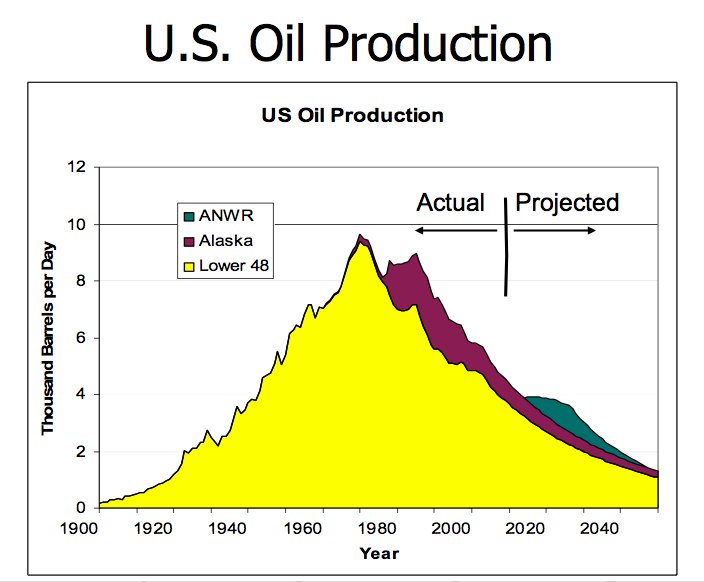Posted by Gail the Actuary
Myth #1: OPEC could produce more if it used current techniques
• International oil companies use same service companies US companies do
• Most are using up-to-date techniques
• Expenditures often are high
• Problem is very old fields
• Overstated reserves raise expectations
Comment: It is easy to see how this myth might arise, if people believe published reserves. Update May 08: The International Energy Association (IEA) has indicated that it plans to sharply reduce its world oil supply forecasts, in its next set of forecasts to be published in November 2008.
Myth #2: Drilling in Arctic National Wildlife Refuge will save us

Comment: This slide is from a presentation of Dr. Sam Shelton of Georgia Tech. The oil from ANWR is expected to provide only a small upward "bump" to US production.
Quite a few of the other much-hyped solutions are expected to provide equivalently little benefit. We will likely need to reduce consumption to better match supply.
It might be noted that the Y scale on this graph should say million barrels a day, not thousand barrels a day. Since I did not make the graph, I can't fix it.
Myth #3: A small downturn can easily be made up with energy efficiency
• The quickest impacts are financial:
---Recession or depression
---Serious recession in 1973 - 75
• Use of biofuels raises food prices:
---Further increases recession risk
• Don't need peak for recession:
--- Only need supply/demand shortfall
---Likely what we are experiencing now
Comment: The connection between oil supply and the economy is not well understood by most. A shortage of oil very quickly leads to an increase in prices, and a cutback in the demand for other goods and services. The combination of these events tends to cause a recession. Cutting back on usage tends not to be sufficient to prevent the problem, because there are so many other users around the world, including in China and the developing world. They are likely to cause an increasing demand for oil, even if we try to cut back.
Myth #4: Canadian oil sands will save us
• Hard to see this with current technology:
---Technology known since 1920s
---Production slow and expensive
• Requires huge amount of natural gas:
---In limited supply
• Most optimistic forecasts equal 5% of current world oil by 2030
---Even this exceeds available natural gas
Comment: There has been commercial development of the Canadian Oil Sands since 1967. Huge amounts have been spent, and there has been great damage to the environment. Even with this, production has remained small--only a little over 1% of world supply. Natural gas limitations suggest that we will never be able to greatly ramp up production.
It might be noted that a similar argument can be made as to why oil shale will not save us from peak oil. At this point, we don't even have an economic method of extracting oil shale. From what we know, extraction will require a large amount of water and considerable electricity. Finding adequate water for extraction is likely to be a problem. It is not clear that we will have extra electricity to spare either, for this large a project. Extraction is likely to be slow and expensive, since it will require moving large amounts of dirt around, plus heating and perhaps chilling the dirt. If we are able to extract oil shale, it will likely be in small quantities.
Myth #5: Biofuels will save us
• Corn-based ethanol has many problems
---Raises food prices, not scalable, CO2 issues, depletes water supply
• Cellulosic ethanol theoretically is better
---Still does not scale to more than 20% of need
---Competes with biomass for electric, home heat
• Biofuel from algae might work
---Not perfected yet
Comment: Every study that has been done recently with respect to corn ethanol seems to come out with worse indications. Corn ethanol has virtually no benefits over petroleum. It uses huge amounts of fossil fuels as inputs, so it has most of the drawbacks of fossil fuels. It also has its own drawbacks, including raising prices, damage to the environment, high water usage, and possible CO2 and other global warming gas increases because of land use changes and nitrogen fertilizer use.
At this point, there aren't good alternatives to gasoline commercially available, however. Since there is great political appeal to growing our own fuel, corn ethanol is supported by most politicians, even if any reasonable analysis would say its benefit is very limited.
Longer term cellulosic ethanol may be a better solution, but at this time it is not commercially available. Even if we use wood and switchgrass as inputs, cellulosic ethanol will be difficult to scale up to provide more than a small share of the needed fuel.
Biofuel from algae looks to some like it might work. At this point, we do not have a commercial way of doing this and the cost would be extremely high.
Reference:
Gail the Actuary, "Peak Oil Overview - March 2008 (Pdf and Powerpoint available)," The Oil Drum, May 25, 2008. 5 myths about oil